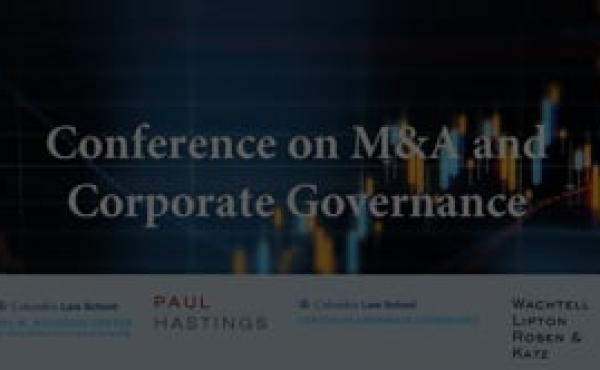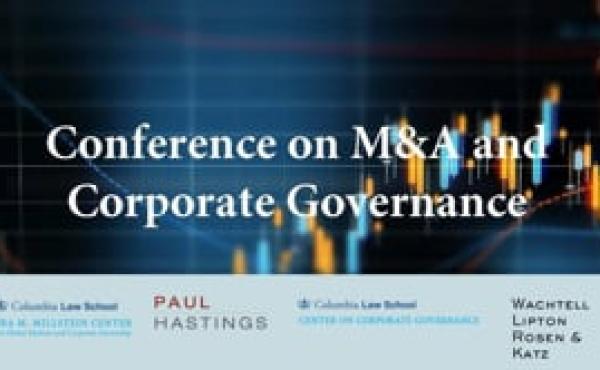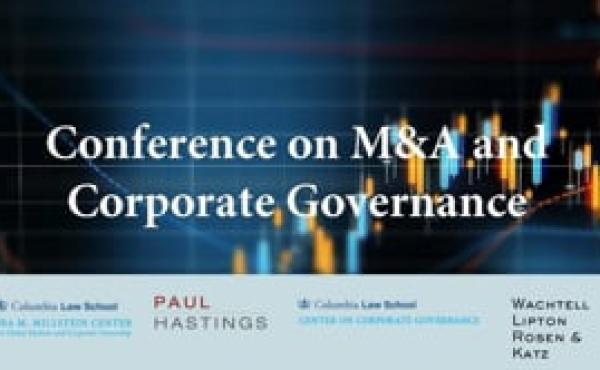
The ECGI blog is kindly supported by

Activists, CEOs, and the Future of Deals
Reflections from the 2024 M&A and Corporate Governance Conference at Columbia Law School.
On a rainy Friday in November, thought leaders from academia, the judiciary, and the legal and financial industries converged at Columbia’s Joseph D. Jamail Lecture Hall to tackle some of the most pressing issues in mergers and acquisitions (M&A) and corporate governance. From shareholder activism to the evolving regulatory landscape and the challenges of balancing short-term activism with long-term governance, the discussions offered insights into a field in constant flux.
Igor Kirman (Wachtell, Lipton, Rosen & Katz) introduced the conference by emphasizing its importance in examining how governance and corporate structure adapt to current political, technological, and market dynamics. He posed questions on the role of corporate political activism and its impact on company performance, using high-profile examples like Elon Musk's management of Tesla and Twitter.
Shareholder Activism in the Spotlight
The first panel, Activism and M&A, kicked off with a lively discussion on the changing face of shareholder activism. As Professor Dorothy Lund of Columbia Law School observed, activism today is more sophisticated, with universal proxy rules adding complexity to board elections and director dynamics.
A notable theme was the evolution of activism’s focus from structural governance issues to operational ones, particularly targeting CEOs. Activists are no longer just advocating for board refreshment or governance reforms—they’re increasingly pushing for changes in management and operations. Ryan Nebel of Olshan highlighted how activists are now zeroing in on operational shortcomings rather than relying on M&A-driven campaigns.
Disney’s proxy fight served as a compelling case study. Panelists like Bruce Goldfarb (Okapi Partners) and John Roe (BlackRock) noted the challenges of tailoring messaging to diverse investor bases. While universal proxy rules have made it easier to mix and match director candidates, they’ve also introduced unprecedented complexity. Roe shared how his team spent over 100 hours analyzing Disney’s proxy materials—a testament to the intricate narratives at play.
One of the most thought-provoking exchanges revolved around the tension between long-tenured directors’ institutional knowledge and activists’ push for fresh perspectives. Panelists debated whether the removal of seasoned directors risks losing valuable strategic insight or if it’s necessary for fostering innovation and adaptability.
The Universal Proxy Rule: A Game-Changer
Universal proxy rules dominated much of the discussion. This new mechanism allows shareholders to vote for any combination of candidates from the management and activist slates, fundamentally altering the dynamics of proxy contests. Elina Tetelbaum of Wachtell, Lipton, Rosen & Katz observed that the rule is forcing both sides to act like nominating committees, carefully evaluating board composition and dynamics.
While the rule enables greater shareholder choice, it has also led to more frequent settlements. Activists, sensing vulnerabilities in boards, are achieving their objectives earlier, often before a formal contest ensues. Panelists like Sean Donahue (Paul Hastings LLP) noted how this trend has shifted the emphasis from confrontation to negotiation, with companies adopting activist-like governance strategies to preemptively address shareholder concerns.
However, there was some skepticism. Lina Tetelbaum and others warned that the universal proxy rule might inadvertently prioritize short-term gains over long-term value creation, as companies focus on appeasing activists rather than pursuing strategic initiatives at their own pace.
Legislative and Regulatory Shifts: The Road Ahead
The second panel explored how legislative and regulatory developments are reshaping the M&A landscape. Moderated by Professor Jeffrey Gordon of Columbia Law School, the discussion delved into how a changing political climate—dominated by rising antitrust scrutiny and evolving ESG considerations—is altering dealmaking dynamics.
David Curran (Paul, Weiss) highlighted how ESG is becoming a pivotal factor in M&A decisions, with sustainability concerns increasingly driving valuation and due diligence processes. Meanwhile, Maria Raptis (Skadden, Arps) and Ivan Schlager (Kirkland & Ellis) pointed out the growing influence of cross-border regulations, especially as governments tighten controls on foreign investments in critical industries.
One significant revelation was the potential impact of a new U.S. administration on M&A policy. Panelists, including Michael Murray (Paul Hastings LLP), speculated on how shifts in leadership at the Federal Trade Commission and Department of Justice might influence antitrust enforcement, with implications for both domestic and cross-border deals. The regulatory environment isn’t just a backdrop—it’s becoming a central character in the M&A story.
Governance Challenges in the Boardroom
The afternoon panel on controlling shareholders emphasised the delicate balance between empowering majority stakeholders and protecting minority investors. Moderated by Professor Zohar Goshen of Columbia Law School, the discussion featured insights from luminaries like former Delaware Supreme Court Justice Jack Jacobs, Tulane Law’s Ann Lipton, Cadwalader, Wickersham & Taft Partner Stephen Fraidin, Bernstein Litowitz Berger & Grossmann Former Partner Mark Lebovitch, and Cravath, Swaine & Moore Partner Daniel Slifkin.
The panelists examined how controlling shareholders wield influence, often blurring the lines between leadership and overreach. One of the most engaging debates revolved around whether boards dominated by controlling shareholders can genuinely act in the best interests of all stakeholders or if they’re inherently compromised.
Another hot topic was the need for better metrics to evaluate board effectiveness. As one audience member pointed out during the Q&A for the first panel, Activism and M&A, there’s a dearth of publicly available tools to quantify the value of good governance. John Roe acknowledged the challenge, noting that while his team uses qualitative assessments to gauge board performance, a more robust framework is needed to link governance quality directly to corporate value.
A Judicial Perspective: Fireside Chat with Vice Chancellor Lori Will
The highlight of the day was a lunchtime fireside chat with Vice Chancellor Lori W. Will of the Delaware Court of Chancery, moderated by Professor Eric Talley (Columbia Law School). Drawing on her judicial experience, Vice Chancellor Will offered insights into the fiduciary duties of directors, particularly when navigating activist pressures or making controversial policy statements.
Takeaways for the Future
Professor John C. Coffee, Jr. (Columbia Law School) concluded the conference by reflecting on the significant evolution of corporate governance practices and their critical role in shaping the future of M&A activity.
Overall, the conference provided a vivid snapshot of a field grappling with profound change. From the rise of activist investors to the influence of regulatory shifts and the enduring challenges of board dynamics, the conference highlighted the intricate interplay of forces shaping corporate governance today. As the conversations revealed, the future of M&A and governance lies in balancing competing demands—short-term activism versus long-term strategy, regulatory compliance versus innovation, and shareholder engagement versus operational independence.
-------------------------------------------
The conference was co-sponsored by the Ira M. Millstein Center for Global Markets and Corporate Ownership (Columbia Law School), Center on Corporate Governance (Columbia Law School), Paul Hastings LLP, Wachtell, Lipton, Rosen & Katz.
The ECGI does not, consistent with its constitutional purpose, have a view or opinion. If you wish to respond to this article, you can submit a blog article or 'letter to the editor' by clicking here.
Watch the videos
Key takeaways from Panel 1
Trends in Shareholder Activism:
- Increased complexity due to the advent of universal proxy rules.
- Activists targeting operational leadership (e.g., CEOs) instead of board members, reflecting a shift toward addressing internal governance.
- Case studies like Disney’s contested election highlighted the challenges of messaging across diverse investor bases.
Universal Proxy and Board Dynamics:
- The universal proxy rule's impact on activism, enabling "split tickets" and increased settlements.
- Concerns over the dilution of institutional memory when long-tenured directors are replaced without thorough assessment.
Activism’s Strategic Evolution:
- Companies preemptively adopting activist-like strategies for governance refreshment, making settlements quicker and activism less confrontational.
- The importance of balancing long-term value creation against short-term performance pressures.
Key takeaways from Panel 2
Changing Regulatory Landscape:
- Anticipated shifts in U.S. policy under a new administration, particularly regarding antitrust enforcement and cross-border M&A.
- Strategies for navigating increased scrutiny on ESG-linked transactions.
Globalization of Regulatory Oversight:
- Panelists discussed how multinational corporations adapt to varying regulatory expectations.
- The potential resurgence of legislative initiatives targeting monopolistic behavior and shareholder protections.
Key takeaways from Panel 3
Governance Challenges:
- Balancing controlling shareholders’ influence with the rights of minority investors.
- Legal mechanisms to ensure accountability, including litigation trends in Delaware courts.
Institutional Memory vs. Board Refreshment:
- Debate over the merits of long-tenured directors versus new appointees in fostering innovation and adaptability.










